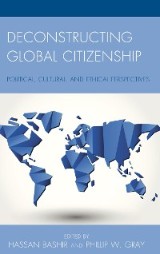Details

Deconstructing Global Citizenship
Political, Cultural, and Ethical Perspectives|
CHF 120.00 |
|
| Verlag: | Lexington Books |
| Format: | EPUB |
| Veröffentl.: | 30.10.2015 |
| ISBN/EAN: | 9781498502597 |
| Sprache: | englisch |
| Anzahl Seiten: | 346 |
DRM-geschütztes eBook, Sie benötigen z.B. Adobe Digital Editions und eine Adobe ID zum Lesen.
Beschreibungen
<span><span>The success of individual nation states today is often measured in terms of their ability to benefit from and contribute to a host of global economic, political, socio-cultural, technological, and educational networks. This increased multifaceted international inter-dependence represents an intuitively contradictory and an immensely complex situation. This scenario requires that national governments, whose primary responsibility is towards their citizenry, must relinquish a degree of control over state borders to constantly developing trans and multinational regimes and institutions. Once state borders become permeable all sorts of issues related to rights earned or accrued due to membership of a national community come into question. Given that neither individuals nor states can eschew the influence of the growing interdependence, this new milieu is often described in terms of shrinking of the world into a global village. This reshaping of the world requires us to broaden our horizons and re-evaluate the manner in which we theorize human personhood within communal boundaries. It also demands us to acknowledge that the relative decline of Euro-American economic and political influence and the rise of Asian and Latin American states at the global level have created spaces in which a de-territorialized and a de-historicized notion of citizenship and state can now be explored. The essays in this volume represent diverse disciplinary, analytical, and methodological approaches to understand what the implications are of being a citizen of both a nation state and the world simultaneously. In sum, </span><span>Deconstructing Global Citizenship </span><span>explores the question</span><span> </span><span>of</span><span> </span><span>whether a synthesis of contradictory national and global tendencies in the term “global citizenship” is even possible, or if we are better served by fundamentally reconsidering our ideas of “citizenship,” “community,” and “politics.”</span></span>
<span><span> The focus of this collection of essays is to explore issues which relate to processes that collectively constitute globalization and the historical and contemporary notions of national citizenship. The essays explore questions related to human personhood and communal belonging as well as the experiences of individual nation states in a globalized world. </span></span>
<span><span>Introduction:</span><span> Deconstructing Global Citizenship, </span><span>Hassan Bashir & Phillip W. Gray </span><span><br></span><span>Chapter 1:</span><span> The Modern State: Citizenship, Multiculturalism and Globalization, </span><span>Francis Robinson </span><span><br></span><span>Chapter 2:</span><span> (Re) Situating the West’s Cultural Others in International Relations Theory: Towards Developing Joint East-West Perspectives, </span><span>Hassan Bashir </span><span>&</span><span> Hamza bin Jehangir</span><span> <br></span><span>Chapter 3:</span><span> The Limited Virtue of Tolerance in a Globalized World, </span><span>Phillip W. Gray</span><span><br></span><span>Chapter 4:</span><span> Civil Economy: Re-imagining an Ethical Economy and the Implications for Citizenship, </span><span>Khalid Mir</span><span><br></span><span>Chapter 5:</span><span> Citizenship in the Age of Global Surveillance: Some Observations on the Change in State-Citizen Relationship, </span><span>Bettina Koch</span><span><br></span><span>Chapter 6:</span><span> Deciding What to Do: A Universal Code of Ethics for Global Citizenship, </span><span>Andrej Zwitter </span><span><br></span><span>Chapter 7:</span><span> Citizenship, History and Culture: Derrida's Monolingualism of the Other in a Post 9/11 World, </span><span>Rashmika Pandya</span><span><br></span><span>Chapter 8:</span><span> Challenges of Religious Universality to Global Citizenship: Ethical Implications for Today, </span><span>Robin Seelan</span><span><br></span><span>Chapter 9:</span><span> Practice-Dependence, Cosmopolitanism and Conflict Avoidance, </span><span>Kevin Gray</span><span><br></span><span>Chapter 10:</span><span> Multiculturalism is Not Dead: Positive Experience of Multicultural Society Management in Russia, </span><span>Yan I. Vaslavskiy</span><span><br></span><span>Chapter 11:</span><span> Faith, Class and Citizenship in Conflict: The Christian Predicament in the Syrian and Egyptian Uprisings, </span><span>Salma Mousa</span><span><br></span><span>Chapter 12: </span><span>Human Security in a Globalized World: Reflections on Japan’s Official Development Assistance Programs, </span><span>Alexandria Innes & Christopher Lamont</span><span><br></span><span>Chapter 13:</span><span> Global Imperatives versus Local Needs: Analysis of Agricultural Development and Food Security in Rural South Asia, </span><span>Sanee Sajjad</span><span><br></span><span>Chapter 14:</span><span> Non-adherence to international IP protection standards in less developed countries: The case of Pakistan, </span><span>Ahmed Bashir</span><span><br></span><span>Chapter 15:</span><span> Mobilizing Democracy in Post-Colonial Africa: The Case for Democracy in the Thought of Kwame Nkrumah, </span><span>Sara Jordan</span><span><br></span><span>Chapter 16:</span><span> Education in a Globalized World: Education City and the Recalibration of Qatari Citizens, </span><span>Tanya Kane</span><span><br></span><span>Chapter 17:</span><span> Qatar’s Globalized Citizenry and the Majlis Culture: Insights from Habermas's Theory of the Development of a Public Sphere, </span><span>Nancy Small</span></span>
<span><span>Hassan Bashir</span><span> is associate professor of political science at Texas A&M University at Qatar.<br><br></span><span>Phillip W. Gray</span><span> is assistant professor of political science at Texas A&M University at Qatar. </span></span>


















